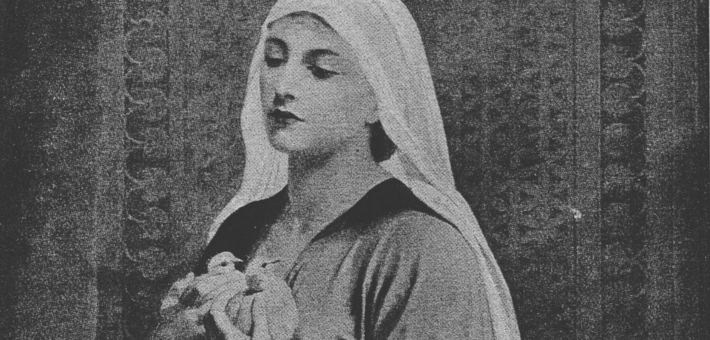Commentary on 1 Kings 17:8-16
The passage immediately preceding 1 Kings 17:8–16 provides important context for this encounter between a woman, who happens to be a widow, and a man, who happens to be a prophet. In 17:1 Elijah announces that there will be no rain in the land unless he manifests it by the power of the Lord. God instructs Elijah to camp at the Wadi Cherith (verse 3), where even those waters eventually evaporated in the proclaimed drought (verse 7).
Elijah is an isolated, and some might venture to say introverted, character throughout most of his career. When we first meet him, he is alone in a wadi with ravens feeding him. The first human contact he makes in the story only occurs after God commands him to approach someone else, a woman in Zarephath, in the northernmost part of Canaan. God commands Elijah to “rise and go” to meet this woman for provision. Most translations of verse 9 read, “I have commanded a widow there to feed you” (New Revised Standard Version).
The Hebrew, however, reads a bit differently, adding the word “woman” in apposition before “widow.” Verse 9 could literally be translated as, “Rise and go to Zarephath, which belongs to Sidon, and dwell there. Look, I have commanded a woman, a widow, to sustain you.” When we see the word “widow” again in translations of verse 10, the Hebrew text also reads “a woman, a widow.” Perhaps the translators here are leaning toward efficiency of language by simply using “widow,” but what might be lost in this truncated translation? Might substituting “widow” for the whole phrase “a woman, a widow” reduce this already unnamed woman to her status as a widow?
In verse 12, we learn that this woman is more than just a widow; she is also a mother. All Elijah knows is that God commanded him to find her. When Elijah asks her for a bite of food, she reveals the desperation of her family’s own scarcity. She is collecting wood to build a fire and bake the last bit of food she and her son have. Elijah encounters her as she prepares for her family’s last supper.
At this moment we might read Elijah as being a bit brash. While he tells her not to fear, he then commands her to make a small cake for him before feeding herself and her son. If read from a modern mindset, we might chide Elijah for gaslighting the woman, putting his own needs above hers and her child’s. A reader familiar with the prophetic motif of miracles, and who recognizes from 17:1 that Elijah has claimed power over the rain, might anticipate what is coming, but would a desperate woman, who has lost her spouse and is contemplating her final meal with her son, suspect that Elijah is a prophet?
Then Elijah reveals himself and his status by uttering the common prophetic formula: “Thus says the LORD, the God of Israel” (verse 14). His oracle is one of blessing and sustenance. God commanded Elijah to find the woman in order to provide for the prophet, and in so doing, the prophet also provides for the woman. In verses 15 and 16, we see that the woman heeds his words, and the prophecy of her sustenance is also fulfilled. Her grain and oil do not fail throughout the period of drought.
The story exhibits a few major principles found in the book of Deuteronomy. First, the condition of drought is the result of the Israelite King Ahab’s disobedience. In Deuteronomy 11:13–14, God says that God will provide rain in its season to produce grain, wine, and oil for the people. If they, however, serve other gods, God will “shut up the skies so that there will be no rain and the ground will not yield its produce” (Deuteronomy 11:17, New Revised Standard Version).
Ellen Davis summarizes this theological principle of reward and retribution: “Overall, from a biblical perspective, the sustained fertility and habitability of the earth, or more particularly of the land of Israel, is the best index of the health of the covenant relationship.”1 In general, an obedient, faithful leader and people will foster the sustainability of the land as well as its inhabitants according to this Deuteronomistic theology.
First Kings 16:31–33 already suggests that Ahab was far from faithful, worshiping Baal and building Baal a temple in Samaria. The story of the woman and her son, however, illustrates how the punishment of the king trickled down to impact the most vulnerable in society. Deuteronomy 24:17 demands justice for the sojourner, the orphan, and the widow, and Deuteronomy 24:19–21 suggests that the community should provide for people who are strangers, orphans, and widows by allowing them to glean the fruit that falls after a harvest. This story illustrates how the consequences of unfaithful leadership often cause the most detriment to the most vulnerable in a society.
By reading the story from the perspective of the unnamed woman, who happens to be a widow, we might reflect on how our society often reduces the vulnerable to a status or label.2 This passage could call pastors and their congregations to reach out to the vulnerable, affirming their full humanity while also providing for their needs. Perhaps we could go even a step further than Elijah did and ask the vulnerable for their names.
Notes
- Ellen F. Davis, Scripture, Culture, and Agriculture: An Agrarian Reading of the Bible (New York: Cambridge University Press, 2009), 8.
- In the following passage, the woman is given another title. The Hebrew reads, “The son of the woman, the mistress of the house, became ill” (1 Kings 17:17, author’s translation). While Elijah refers to her as “the widow” in 17:20, 1 Kings 17:23 refers to her as the boy’s mother.


November 10, 2024